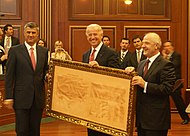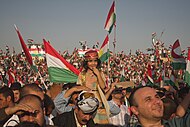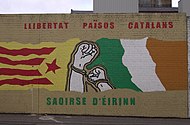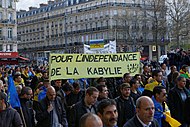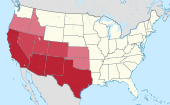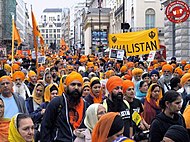From Wikipedia, the free encyclopedia
https://en.wikipedia.org/wiki/Separatism
Separatism is the advocacy of cultural, ethnic, tribal, religious, racial, governmental or gender separation from the larger group. As with secession, separatism conventionally refers to full political separation. Groups simply seeking greater autonomy are not separatist as such. Some discourse settings equate separatism with religious segregation, racial segregation, or sex segregation, while other discourse settings take the broader view that separation by choice may serve useful purposes and is not the same as government-enforced segregation. There is some academic debate about this definition, and in particular how it relates to secessionism, as has been discussed online.
Separatist groups practice a form of identity politics, or political activity and theorizing founded in the shared experiences of the group's members. Such groups believe attempts at integration with dominant groups compromise their identity and ability to pursue greater self-determination. However, economic and political factors usually are critical in creating strong separatist movements as opposed to less ambitious identity movements.
Motivations
Groups may have one or more motivations for separation, including:
- Emotional resentment and hatred of rival communities.
- Protection from genocide and ethnic cleansing.
- Resistance by victims of oppression, including denigration of their language, culture or religion.
- Influence and propaganda by those inside and outside the region who hope to gain politically from intergroup conflict and hatred.
- Economic and political dominance of one group that does not share power and privilege in an egalitarian fashion.
- Economic motivations: seeking to end economic exploitation by more powerful group or, conversely, to escape economic redistribution from a richer to a poorer group.
- Preservation of threatened religious, language or other cultural tradition.
- Destabilization from one separatist movement giving rise to others.
- Geopolitical power vacuum from breakup of larger states or empires.
- Continuing fragmentation as more and more states break up.
- Feeling that the perceived nation was added to the larger state by illegitimate means.
- The perception that the state can no longer support one's own group or has betrayed their interests.
- Opposition to political decisions.
Types
Ethnic separatism
Ethnic separatism can be based on cultural, linguistic as well as religious or racial differences. Ethnic separatist movements were relevant since they represented historical delineations between states, or in recent times, were the cause of conflicts between peoples in Europe, Africa and Asia with different ethnic/linguistic origins.
Africa
- Africa's hundreds of ethnic groups are subsumed into 54 nation states, often leading to ethnic conflict and separatism, including in Angola, Algeria, Burundi, the Caprivi Strip in Namibia, Congo and The Democratic Republic of the Congo, Darfur in Sudan, Ethiopia, Senegal, South Africa, Uganda, Western Sahara, and Zimbabwe
- The Biafran War in the 1960s among Igbos, Hausa–Fulani and Yoruba, today's ethnic and oil-related conflict in the Niger Delta of Nigeria
- Conflicts in Liberia between African-Liberians and Americo-Liberians, people of African descent who immigrated from the Americas after being freed from slavery
- Boere-Afrikaners separatists
- The Tuareg separatists in Niger and Mali
- Anjouan's separatism in the Union of Comoros as the island is a separate community from that of Comoros
Asia
- The Soviet Union's dissolution into its original ethnic groupings which formed their own nations of Armenia, Azerbaijan, Georgia, Kazakhstan, Kyrgyzstan, Tajikistan, Turkmenistan, and Uzbekistan
- Turkish separatism in Cyprus (Northern Cyprus)
- South Ossetian and Abkhazian separatism in Georgia
- Armenian separatists of Nagorno-Karabakh in Azerbaijan
- Kurdish separatism in Iran, Iraq, Syria, and Turkey
- Separatist movements of Pakistan, including the Balochistan movement and the Sindhudesh movement
- Separatist movements of India, including the Assam separatist movements, the Insurgency in Jammu and Kashmir, and the Insurgency in Northeast India
- Sri Lanka's ethnic Tamil minority separatism in Tamil Eelam
- Several ethnic minority groups fighting for separate states in Myanmar (Burma), including the Chin, Kachin, Karen, Rakhine, Rohingya, Shan, and the Wa
- Ethnic Malay separatism in Thailand
- Tibet has a government in exile established by the 14th Dalai Lama of Tibet
- Uyghurs have a government in exile advocating for the "restoration of East Turkistan's independence, the East Turkistan Government-in-Exile does not consider themselves as "separatists" because they believe that, "you can't separate from something you don't belong to"
- Azerbaijani separatism in Iran (South Azerbaijan)
- Sabah Sarawak Keluar Malaysia in Sabah (North Borneo) and Sarawak, East Malaysia
Europe
- Sorbs separatism in Germany (Lusatia)
- The Faroe Islands, an autonomous territory within the Kingdom of Denmark, has ongoing independence movement
- Silesian separatism in Czechia and Poland
- Basque and Catalan separatism in Spain, minor separatist movements in Andalusia, Asturias, Balearic Islands, Canary Islands, Castile (almost non-existent), Galicia, Navarre and Valencia (see nationalisms and regionalisms of Spain)
- "Celtic nations" in the British Isles have created various separatist movements from the United Kingdom described as Cornish nationalism, Irish republicanism, Scottish independence, and Welsh nationalism
- France's Basque, Catalan, Corsican, Breton, Occitan, and Savoyan separatists
- Italy's separatist movements in Friuli, Padania, Sardinia, Sicily, South Tyrol, and Veneto
- Bavarian separatism in Germany, despite the Bavarian Land being referred to as the Bavarian Free State
- Belgium granting Dutch-speaking Flanders and French-speaking Wallonia greater autonomy
- In the Netherlands, some Frisians covet an autonomous country or area (see Fryske Beweging on the West Frisian Wikipedia)
- Switzerland's newer divisions into cantons along geographical, religious and linguistic lines, such as the canton of Jura.
- Future of Åland, separatist political party in Åland
- Chechen separatism in the North Caucasus, currently the Republic of Chechnya is part of the Russian Federation
- Russian separatism in Crimea (Annexation of Crimea)
- Serb separatism in Bosnia and Herzegovina (Republika Srpska) and Kosovo (North Kosovo)
- Albanian separatism in Kosovo, North Macedonia, and Serbia
- Greeks (Northern Epirotes) separatism in Northern Epirus region of Albania
- The Soviet Union's dissolution into its original ethnic groupings which formed their own nations of Belarus, Estonia, Latvia, Lithuania, Moldova, Russia, and Ukraine
- Conflicts in Ukraine, such as the Russo-Ukrainian War, and the 2022 Russian invasion of Ukraine.
- Greenland, an autonomous territory within the Kingdom of Denmark, has an ongoing independence movement.
North America
- Independence movement in Puerto Rico with the goal of obtaining complete independence from the United States
- Vieques, an island in Puerto Rico, which is a territory of the United States, had a referendum in 2019 to separate from Puerto Rico and become another territory of the United States.
- Hispanic (mostly Chicano) separatism, as embodied in the Chicano Movement (or Chicano nation) in the United States sought to recreate Aztlán, the mythical homeland of the Uto-Aztecs comprising the Southwestern United States which is home to the majority of Mexican Americans; They drew on the Latin American concepts of racial identity such as the bronze race and La Raza Cósmica. Today, a small Raza Unida Party continues with similar goals
- French-Canadian separatists are mainly found in the French-majority province of Quebec, Canada; with the goal of creating an independent state for the preservation of French language and culture and French Canadian nation in North America
- Most North American and many other Native American groups already have a high degree of autonomy. Complete separatism is advocated by some members of the Canadian First Nations, American Indian Movement, Republic of Lakotah (Lakota Sioux people in South Dakota), and tribal groups in Eastern Oklahoma, most notably the Cherokee people of the Cherokee Nation of Oklahoma
Oceania
- Free Papua Movement in the West Papuan region, Indonesia
- Māori separatism in New Zealand
- Bougainvillean separatism in Papua New Guinea
- Hawaiian sovereignty movement seeks some form of sovereignty for Hawaii
- New Caledonia's pro-independence movement
- Easter Island (rapanui) separatism and autonomism movement.
South America
- The South is My Country in Brazil. Claims independence of 3 states, most of them have a white-majority population with ethnic German and Italian roots
- Mapuche movement in Chile and Argentina. Although explicitly have no separatist discourse, groups as Resistencia Ancestral Mapuche and Coordinadora Arauco Malleco made calls and actions about Territorial Recuperation, in opposition to states.
- Zulian separatism in Venezuela.
Gender separatism
The relationship between gender and separatism is complex. Feminist separatism is women's choosing to separate from ostensibly male-defined, male-dominated institutions, relationships, roles and activities. Lesbian separatism advocates lesbianism as the logical result of feminism. Some separatist feminists and lesbian separatists have chosen to live apart in intentional community, cooperatives, and on land trusts. Queer nationalism (or "Gay separatism") seeks a community distinct and separate from other social groups. In the other hand, the male supremacist MGTOW movement it's considered sometimes a male-gender separatism, as at the center of this ideology is the notion of male separatism where men should be apart of a feminist-biased society, proposing even an utopical no-women state.
Geographical and socioeconomic separatism
- Alberta separatism
- Berber separatism in North Africa
- Cape Independence
- Cascadian separatists
- Catalan independence movement
- Provisional Revolutionary Government of Cibao
- Hong Kong independence movement
- New England New State Movement
- Malaysian Sabah and Sarawak separatists
- Quebec sovereignty movement
- Scottish independence
- Taiwanese independence
Racial separatism
Some separatist groups seek to separate from others along racial lines. They oppose interracial marriage and integration with other races and seek separate schools, businesses, churches and other institutions, and often separate societies, territories, countries, and governments:
- Black separatism (also known as black nationalism) is the most prominent wave advancing the concepts of "Black racial identity" in the United States and has been advanced by black leaders like Marcus Garvey and organizations such as the Nation of Islam. Critical race theorists like New York University's Derrick Bell and University of Colorado's Richard Delgado argue that US legal, education and political systems are rife with blatant racism. They support efforts like "all-black" schools and dorms and question the efficacy and merit of government-enforced integration. In 2008 statements by Barack Obama's former pastor Jeremiah Wright, Jr., revived the issue of the current relevance of black separatism.
- Latin American concepts of racial identity such as the bronze race and La Raza Cósmica are found in the small separatist Raza Unida Party. The Chicano Movement (or Chicano nation) in the United States sought to recreate Aztlán, the mythical homeland of the Aztecs comprising the Southwestern United States.
- White separatism in the United States and Western Europe seeks separation of the white race and limits to nonwhite immigration under the argument that these policies are necessary for white race's survival.
Religious separatism
Religious separatist groups and sects want to withdraw from some larger religious groups and/or believe they should interact primarily with coreligionists:
- English Christians in the 16th and 17th centuries who wished to separate from the Church of England and form independent local churches were influential politically under Oliver Cromwell, who was himself a separatist. They were eventually called Congregationalists. The Pilgrims who established the first successful colony in New England were separatists.
- Christian separatist groups in Indonesia, India and South Carolina (United States)
- Zionism sought the creation of the State of Israel as a Jewish homeland, with separation from gentile Palestinians. Simon Dubnow, who had mixed feelings toward Zionism, formulated Jewish Autonomism, which was adopted in eastern Europe by Jewish political parties such as the Bund and his own Folkspartei before World War II. Zionism can also be seen as somewhat ethnic too, however, as its definition of who is Jewish has often included people of Jewish background who do not practice the Jewish religion. It is further complicated as some who had ancestors who converted to Judaism, such as some Ethiopian Jews, may not share ethnic history with the Jews, however, are considered to be so but not without debate.
- The Partition of India and (later Pakistan and Bangladesh) arose as a result of separatism on the part of Muslims.
- Sikhs in India sought an independent nation of Khalistan after an agitation in the 1970s and 1980s for implementation of the Anandpur Sahib Resolution (demanding things such as a greater share of river water and autonomy for Punjab) resulted in the storming of the Harimandir Sahib (Golden Temple) by the Government of India troops in 1984. The storming of the temple to flush out Sikh Militants who were gaining momentum in their agitation for greater autonomy for Punjab resulted in Sikhs demanding an independent state for the Sikhs situated in Punjab known as Khalistan. The conflict escalated and led to an assassination of the Prime Minister of India Indira Gandhi as a retaliation of an Indian military operation called 'Operation Blue Star' directed against the Sikhs' holiest shrine, the Golden Temple, in which many innocent Sikh civilians too lost their lives. The revenge murder of Gandhi evoked a Congress Party led backlash in the form of the Sikh genocide, which started in New Delhi and swept India in November 1984. That only further strengthened the Khalistan Movement, but it was largely subdued owing to the efforts of the police in Punjab. The controversial response by the Punjab State reportedly involved the use of human rights violations in the form of unexplained disappearances, faked encounters killings, rape and torture. However, many in the Sikh diaspora in the West and even Sikhs in India, still support the idea of Khalistan, but support is dying and generally the Indian Sikh population is patriotic towards India or at least not supportive of the idea of Khalistan.
- Muslim separatist groups in the Philippines (Mindanao and other regions: Moro Islamic Liberation Front, Abu Sayyaf), in Thailand (see also South Thailand insurgency), in India (see also Insurgency in Jammu and Kashmir), in the People's Republic of China (Xinjiang: East Turkestan Islamic Movement), Tanzania (Zanzibarian separatist movements), in the Central African Republic (Regions that are inhabited by Muslims: Séléka), in Russia (in the Northern Caucasus, especially in Chechnya: Caucasus Emirate), in Yugoslavia (Bosnia and Herzegovina: Alija Izetbegovic espoused an Islamic inspired separatism)
Governmental responses
How far separatist demands will go toward full independence, and whether groups pursue constitutional and nonviolent action or armed violence, depend on a variety of economic, political, social and cultural factors, including movement leadership and the government's response. Governments may respond in a number of ways, some of which are mutually exclusive. Some include:
- accede to separatist demands
- improve the circumstances of disadvantaged minorities, be they religious, linguistic, territorial, economic or political
- adopt "asymmetric federalism" where different states have different relations to the central government depending on separatist demands or considerations
- Allow minorities to win in political disputes about which they feel strongly, through parliamentary voting, referendum, etc.
- Settle for a confederation or a commonwealth relationship where there are only limited ties among states.
Most governments suppress any separatist movement in their own country, but support separatism in other countries.

